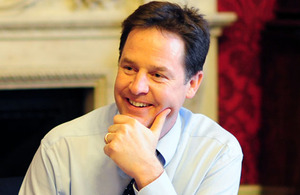Nuclear Security Summit in Seoul
Remarks made by the Deputy Prime Minister, Nick Clegg, at the Nuclear Security Summit in Seoul on 27 March 2012.

In his opening comments, the Deputy Prime Minister is responding to allegations from the Head of the Argentinean delegation - Hector Timerman, Argentine Minister of Foreign Affairs - that an extra regional power had deployed a submarine capable of carrying nuclear weapons in the South Atlantic in violation of the treaty of Tlatelolco (nuclear weapons-free zone covering Latin America and the Caribbean).
Thank you Mr President. Before I turn to the issue at hand, I’m afraid I’m duty bound to respond to the insinuations made by the Argentinean delegation of militarisation of the South Atlantic by the British Government.
These are unfounded, baseless insinuations. As I’m sure our colleague from Argentina knows the United Kingdom ratified the protocols to the treaty in 1969, the treaty referred to by President Pinera which guarantees a nuclear weapons-free zone covering Latin America and the Caribbean. We have respected those obligations since 1969 and we will continue to do so.
Turning to what the United Kingdom is doing in the area of nuclear security, having given my account yesterday evening of what we’ve done in the past, we’ve been busy, and will continue to be busy, at home. We will be opening a new nuclear forensics laboratory, one of only a handful in the world able to investigate crimes involving nuclear and radioactive materials for the first time.
We will continue to improve governance and ensure compliance through a new independent Office for Nuclear Regulation. We’ll keep working on plans for managing our inventory of civil separated plutonium and with our French friends we’ll implement a new bilateral agreement to co-operate more closely on civil nuclear security and emergency responses.
To underline what we’ve been doing at home today, we are releasing previously classified information on how we’ve used high-tech equipment at our borders since 2001 to detect the trafficking of nuclear material and how also in recent years we have developed specialised teams ready to diffuse improvised suitcase bombs. That is information which we’ve made public for the first time today.
Overseas in the coming months and years we will keep offering funding and expertise wherever that is useful. We will use our 2013 presidency of Global Partnership Against The Spread of the Weapons of Mass Destruction, of which I know many of us here are members. Alongside the United States and France we are pledging to help improve our collective understanding of the different levels of protection needed by different materials and to develop emergency response teams.
I just finally want to emphasise one area of work which we will be applying ourselves to most particularly in the coming months and years and that is of nuclear information. Together we’ve done well in the last couple of years in locking away nuclear materials but we need to do more to focus on protecting the information that terrorists need to obtain and then use with those materials - maps of nuclear sites, designs for improvised bombs, how to get past border security, beating emergency response teams and so on.
So we must, for example, make sure sensitive documents are properly protected, make sure that staff working on industrial sites are assessed for personal reliability, raise awareness amongst scientists of the dangers inherent in the knowledge which they possess and of the responsibility they must share. And I’m delighted and grateful that so many of you, thirty delegations around the table today, are joining us in a statement to make our commitment to this work on information really concrete in the months and years ahead.
And in that spirit I would very much echo the sentiments of a number of previous speakers that the significance of the summit here in South Korea is not so much the quality of our final communique, important though that is, but it is the rigour and quality of the concrete material steps that we take in the weeks and months and years ahead to ensure that nuclear materials and nuclear information does not fall in to the hands of people who wish us harm and to wish so much damage to be wreaked on our populations and our societies.
Thank you.